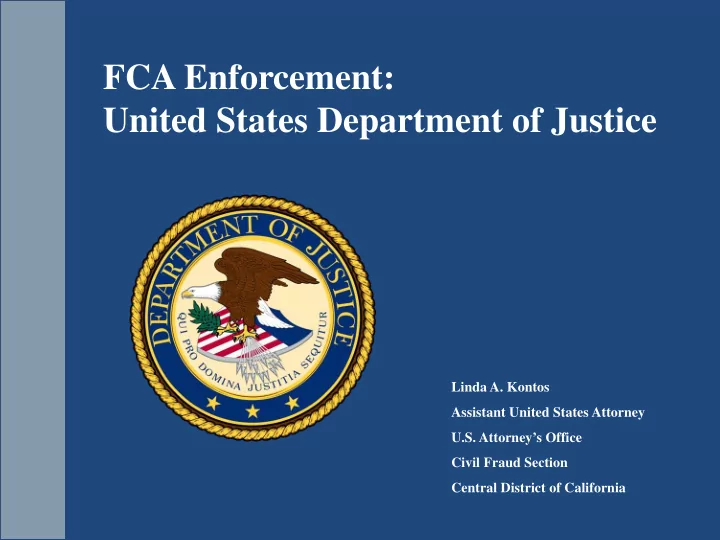

FCA Enforcement: United States Department of Justice Linda A. Kontos Assistant United States Attorney U.S. Attorney’s Office Civil Fraud Section Central District of California
Overview: False Claims Act: 31 U.S.C. § 3729 et seq. � Background Re: Government FCA Investigation � Fraud Enforcement and Recovery Act of 2009 (“FERA”) � Affordable Care Act of 2010 & the Anti-Kickback Statute � The views expressed today, in this oral and PowerPoint � presentation and in conversation with you, are those only of Linda Kontos personally, and are not, and should not be taken as, official positions of either the Office of the United States Attorney or the Department of Justice. 2
Our “Mission” � Recover $$$ Taken By False Pretenses and Other Misconduct From Federally Funded Health Insurance Programs ( e.g. , Medicare & Medicaid) � Deter Conduct By Penalizing Those Who Engage In The Wrongdoing 3
Our Main Tool: Civil False Claims Act (“FCA”) Primary Statute Used To Combat Fraud Against the U.S. � Liability for TREBLE the amount of damages sustained by the U.S. + � Civil penalty per false claim and false statement: $5,500 - $11,000 + � Exclusion/debarment from program (admin. remedy) 4
Elements Required to Prove a Case: � CLAIM FOR PAYMENT TO THE GOVERNMENT � FALSITY � MATERIALITY � REQUIRED STATE OF MIND (“SCIENTER”) 5
Examples of Falsity � Services not rendered (the provider claims they were rendered by submitting a bill for payment) � Upcoding (billing for a more expensive and extensive service than the one actually rendered) � Services not medically necessary � Claim tainted by kickbacks 6
Required State of Mind � Required State Of Mind (Scienter) � Statute Defines “Knowledge” As: � Actual knowledge OR � Deliberate ignorance OR � Reckless disregard of the truth or falsity of the information 7
Mechanics of a Qui Tam (Whistleblower) Action � Suit is Filed Under Seal (Confidential) � Government Investigates � Government Intervenes or Declines Intervention � Case Either Settles or Proceeds to Trial 8
The Investigation - Phase 1 Different Tools - Examples Civil Criminal Administrative � � � � CIDs or � Search � Suspension subpoenas Warrants of Payments � Documents � AIDs � Interrogatories � Grand Jury Subpoenas Seizure Warrants and Asset Forfeiture (Civil or Criminal) 9
The Investigation - Phase 2 Putting the Evidence Together � Document Review � Witness Interviews � CID Depositions � Experts/Consultants � If Criminal investigation: � Consensual monitoring � Undercover operations 10
The Investigation – Phase 3 � Settlement � Intervention or Declination (Qui Tam) � Gear Up for Trial � Document Requests � Interrogatories � Requests for Admission � Depositions � Motions (dismissal, summary judgment) � Trial 11
The Fraud Enforcement and Recovery Act of 2009 (“FERA”) � Became law May 20, 2009 � 1st significant revision of FCA in > 20 yrs. � § 4 contains FCA amendments – “Clarifications to the FCA to Reflect the Original Intent of the Law” � Primary Purpose – � To overrule judicial decisions with which Congress disagreed 12
FERA: Civil Investigative Demands � CIDs: have previously been sparingly issued for documents, interrogatories, and depositions � FERA allows sharing of information obtained by CIDs with Relators (whistleblowers) “if the Attorney General or designee determine it is necessary as part of any false claims act investigation.” § 3733(a)(1) 13
FERA: “Reverse” False Claims Former § 3729 (a)(7): New § 3729 (a)(1)(G): False statement required Not required for clause 2 Liability: “knowingly, makes, uses “[1] knowingly makes, uses or causes or causes to be made or used, a false to be made or used, a false record or record or statement to conceal, avoid, statement material to an obligation or decrease an obligation to pay or to pay or transmit money or transmit money or property to the property to the Government, Government” (emphasis added) or [2] knowingly conceals or knowingly and improperly avoids or decreases an obligation to pay or transmit money or property to the Government” 14
FERA: “Reverse” False Claims cont’d. Clause 2 (new): knowingly conceals or knowingly and improperly avoids or decreases an obligation to pay or transmit money or property to the Government � No false statement necessary � Liability for retaining federal funds you are not entitled to have ( e.g. , Medicare overpayments) � FCA now specifically defines “obligation” to include “retention of any overpayment. . . .” § 3739(b)(4) � Knowing retention of overpayment: FCA liability if funds initially improperly paid or if funds legitimately received initially but later required to be returned 15
The Patient Protection & Affordable Care Act (“PPACA”): FCA & AKS � FCA actions regularly have been brought based on an underlying violation of the Anti-Kickback Statute (“AKS”) – 42 U.S.C. § 1320a-7b � The AKS makes it a criminal offense to “knowingly and willfully” exchange remuneration for a referral for medical items/services that may be paid for by a federal health care program ( e.g. , Medicare/Medicaid). 16
AKS – Ninth Circuit Specific Intent � Hanlester Network v. Shalala , 51 F.3d 1390 (9th Cir. 1995) � Under Hanlester , prosecutors in the Ninth Circuit were required to show that a defendant “(1) kn[e]w that [the AKS] prohibits offering or paying remuneration to induce referrals, and (2) engage[d] in prohibited conduct with the specific intent to disobey the law .” Id. at 1400 (emphasis added). 17
PPACA: No Specific Intent Under AKS � PPACA § 6402(f) expressly provides that any claim submitted in violation of the AKS “constitutes a false or fraudulent claim” under the FCA � PPACA § 6402(f) adds language to the AKS – “(h) . . . a person need not have actual knowledge of [the AKS] or specific intent to commit a violation of this section.” � Appears to legislatively overrule Hanlester , as specific intent is not required 18
QUESTIONS??? Linda A. Kontos, AUSA United States Attorney’s Office Civil Fraud Section Healthcare Fraud Coordinator 213.894.3986 Linda.kontos@usdoj.gov 19
Recommend
More recommend